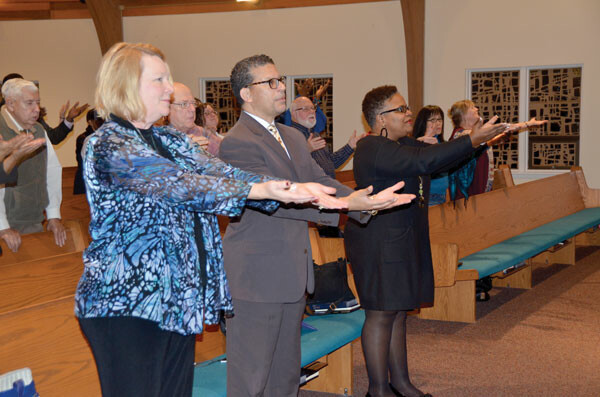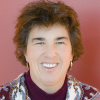Bishop Easterling visits ‘on the district’
By Melissa Lauber & Erik Alsgaard
UMConnection Staff

In keeping with the circuit rider tradition, Bishop LaTrelle Easterling recently traveled to the districts of the Baltimore-Washington Conference to meet separately with clergy and laity, to hear what’s on their minds and to share the age-old question: “How is it with your soul?”
At the meetings, a number of common themes emerged. Two of the most popular were how
At the clergy sessions, pastors voiced a shared concern about how to speak prophetically and boldly from the pulpit to a culture that is feeling increasingly divided and losing hope in the church’s relevance. The laity more frequently spoke about their own focus on issues like prison ministry, health care for the poor, guns and violence, climate control and immigration.
Some people brought their concerns about how well or quickly things were being accomplished by the annual conference. While she took note of every comment to address with staff, Bishop Easterling also “pushed back,” reminding those in both the pews and the pulpits that they, themselves, are the Baltimore-Washington Conference. You are “the connection, … holy co-conspirators, serving in the Kingdom of God,” she said.
During most of the time during the 14 two-hour sessions on the seven districts, (the Washington East meetings were postponed) the bishop shared her thoughts on creating and sustaining life-transforming faith communities. (See story,
But she also took time at each session to thank and celebrate the people in the BWC’s 628 churches, noting that this conference has an above-average abundance of intelligent and deeply gifted people.
When asked for the advice she would offer to spiritual leaders, she told them: “Service in God’s kingdom is a privilege. Stay on your knees. Being a lone ranger is dangerous. Methodists are connectional — iron sharpens iron. Read everything you can; read ‘til your eyes hurt. Teach. Introduce your folks to books. Intellectual curiosity is a large part of who
Noting the profound challenges facing our communities, nation
“We are a people of God,” she said. “Pastors, this is not the time for weak sermons. If you’re still preaching with three stories and a joke, let it go. This is not the time to get weak-kneed. We need to stand up and tell somebody the truth. … This is a time the clergy have to wear out a good set of knees. We need to lay out prostrate before the
The divides that separate the culture, have, in some ways, entered The United Methodist Church as it addresses its stance on homosexuality.
The Commission on the Way Forward is currently at work for the Council of Bishops studying and creating a way that might allow for unity within the denomination, which considers homosexuality “incompatible with Christian teaching.” Two of the primary topics being considered are the marriage of
Bishop Easterling updated BWC members on this process and asked that, first and foremost, people pray and continue to pray.
“We must remain in prayer, and listen for truth,” she said.
Noting that every other Protestant denomination addressing this issue has failed to stay together, Bishop Easterling related a story.
“An Episcopal priest came to me and said, ‘the world is watching.’ This is our witness to the world. The world needs our deep prophetic voice right now.”
Easterling noted that, for her, one of the most important parts of this discernment process has been observing how the Commission members “have been able to come together, to get out of their silos and certitude and sit down to know and understand one another more deeply and to listen to one another.
“… We’ve lost the ability to listen to each other,” she said. “If we’re people of
Easterling asked the people of the Baltimore-Washington Conference, as certain and sure as they are, to be still and open enough to take a step back and ask themselves, “What if I’m wrong?” Wrestling with that question, she said, “should open up space and give enough room for healthy and holy conversation.”
The bishop also addressed issues of clergy self-care, sharing that conference pastors have recently reported dealing with suicidal thoughts.
“I never met a pastor who crossed a boundary (into inappropriate behavior) who was taking care of themselves. You all are candidates for bad decision making,” she said, urging the clergy to observe Sabbath and take time for physical, mental and spiritual wholeness.
She also shared, in some sessions, the dangers of people in a congregation who become “clergy-killers” — obstructing and obfuscating and undermining the ministry of the church. We shouldn’t and won’t be imprisoned by those people, she said.
People in a few of the districts also expressed concern and asked the bishop about issues of safety following the shooting of 26 people at First Baptist Church in Sutherland Springs, Texas, in November.
At the clergy gathering on the Cumberland-Hagerstown District on Nov. 13, that shooting was front and center. One pastor said that church leadership had decided the answer to church safety was for her/him to wear a gun during worship.
After listening attentively, the bishop responded.
“I hope we are not locking our church doors, especially on Sunday. We’re all vulnerable. Be vigilant, be prepared. Remember, after Jesus died, the disciples were all together in the Upper Room… and the door was locked. Why? Out of fear.”
The bishop also repeatedly stressed at that and other gatherings that she does not advocate for, nor want, her pastors “packing heat” in church.
“You have to decide,” the bishop said, “can I kill another human being? If not, don’t carry.”
Bishop Easterling also noted that, as she travels throughout Maryland, Washington, D.C. and the panhandle of West Virginia, she finds that the conference is often challenged by racial silos.
“People seem to increasingly want to be with the people who look like them,” she said. “We have to name this. We have to speak to this.”
Addressing the need for more young people in the church was also an issue asked about many times.
“How do we get more young adults in our churches,” several people inquired. To which the bishop replied, “We need to reclaim our joy. Tell it from the rooftops, I’m a bishop who lets people take risks.”
This was the second year in a row that Bishop Easterling visited the districts. In 2016, shortly after being assigned to the BWC, she

